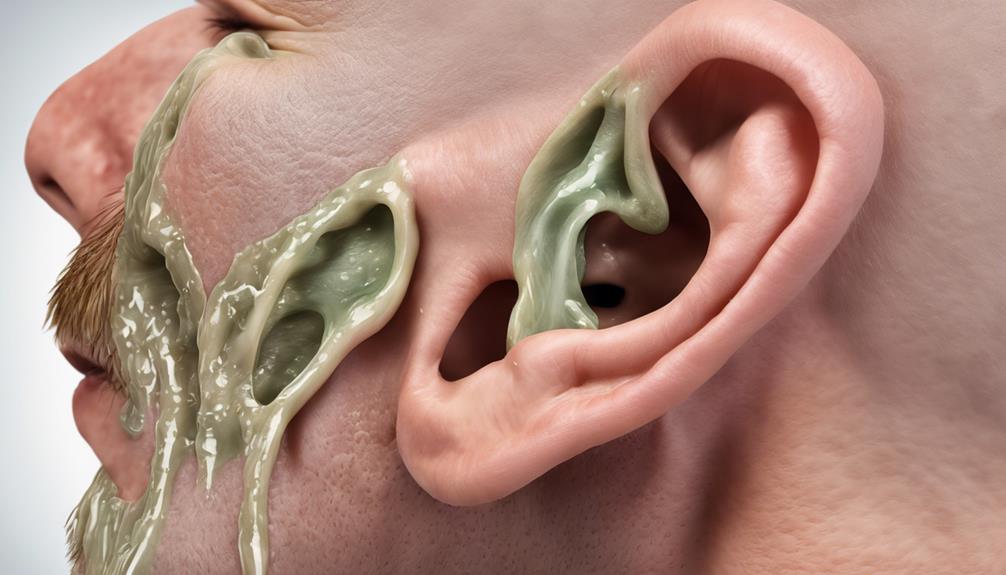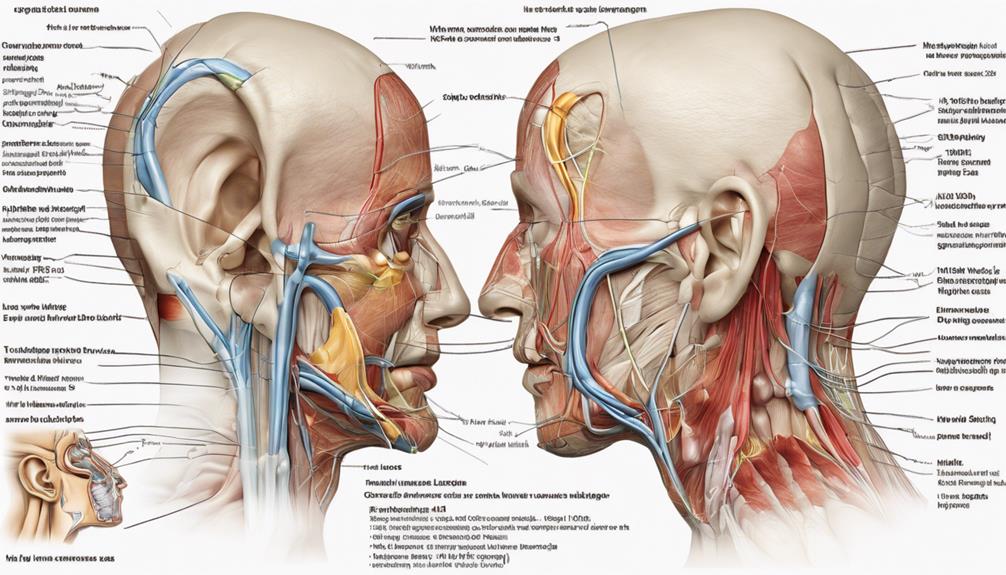Exploring the complexities of how our body’s systems are connected, some may be surprised by the significant impact post-nasal drip can have on our hearing.
Understanding the potential path from a seemingly common nasal issue to hearing concerns is essential for overall health.
Let's explore the intricate relationship between post-nasal drip and hearing loss, shedding light on preventive measures and management strategies that could make a significant difference in our well-being.
Key Takeaways
- Post nasal drip can lead to eustachian tube dysfunction, impacting middle ear pressure.
- Untreated post-nasal drip may result in ear infections, contributing to hearing loss.
- Effective management of post-nasal drip is crucial to prevent tinnitus and ear issues.
- Sinus infections from post-nasal drip can cause abnormal ear pressure, risking hearing loss.

Joanbro Personal Sound Amplifier for Seniors, Voice Enhancement Devices, Pocket Sound Amplifiers for Elderly People, Adults, 50dB Gain, with Headphones & Earbud, 3 Types Mics, 3 Tone, Volume Control
SUPERIOR PERSONAL SOUND AMPLIFIER: Applying noise cancelling, automatic gain control and advanced amplifying circuit, this sound amplifier device...
As an affiliate, we earn on qualifying purchases.
Understanding Post Nasal Drip and Hearing
Understanding the relationship between post-nasal drip and hearing involves recognizing the impact of nasal secretions on the function of the auditory system.
When post-nasal drip occurs, excess mucus can accumulate in the nasal passages and flow into the eustachian tube, leading to dysfunction. This dysfunction can cause pressure changes within the middle ear, affecting the ability of the ear to conduct sound effectively along the auditory pathways.
In cases of chronic post-nasal drip, the persistent presence of mucus can contribute to middle ear infections, further exacerbating hearing issues. Additionally, post-nasal drip resulting from sinus infections can create abnormal pressure in the ears, potentially leading to hearing loss.
The mucous membranes lining the eustachian tube and middle ear are sensitive to these changes, highlighting the intricate relationship between post-nasal drip and auditory health. Addressing post-nasal drip promptly is essential in preventing complications such as middle ear infections and hearing loss associated with this condition.

Dr.meter Noise Reduction Ear Muffs, Noise Cancelling Headphones for Adults, Kids Autism Sensory Ear Protection Earmuffs, 31dB Hearing Protection for Shooting Gun Range, Mowing, Fireworks, Concerts
【Comfort and Snug】: Say goodbye to bulky earmuffs! Dr.meter noise cancelling headphones are made of premium memory foam...
As an affiliate, we earn on qualifying purchases.
Impact of Post Nasal Drip on Ears

Post-nasal drip can disrupt normal ear drainage processes, potentially leading to hearing impairment due to changes in middle ear pressure and fluid accumulation. When post-nasal drip affects the ears, it can have several significant impacts:
- Eustachian Tube Dysfunction: Post-nasal drip can lead to dysfunction of the eustachian tube, which is responsible for regulating pressure in the middle ear.
- Fluid Buildup: Ears may not drain properly due to post-nasal drip, leading to fluid accumulation in the middle ear, which can affect hearing ability.
- Eustachian Tube Issues: Chronic post-nasal drip can result in eustachian tube issues, disrupting the balance in ear pressure and potentially causing hearing loss.
Addressing post-nasal drip promptly is crucial to prevent complications such as tinnitus and ear infections. Understanding the impact of post-nasal drip on ear health can help individuals take proactive steps to maintain their hearing acuity and overall well-being.

Joanbro Hearing-Amplifiers for Seniors, Sound-Amplifier with Adjustable Volume & Tone Control, Handheld Pocket Size Hearing Assisted Devices with Replaceable Microphone, Headphones, Earbuds, Batteries
Clearer Hearing Anytime, Anywhere: Boosts voice up to 50dB- perfect for TV watching, daily conversations, or outdoor activities....
As an affiliate, we earn on qualifying purchases.
Preventing Hearing Loss From Post Nasal Drip
When addressing the impact of post-nasal drip on ear health, it becomes imperative to implement preventive measures to mitigate the risk of hearing loss associated with eustachian tube dysfunction. Eustachian tube dysfunction, often caused by post-nasal drip, can lead to hearing issues due to the blockage it creates.
To prevent potential hearing problems, regular nasal irrigation can be a valuable tool. Nasal irrigation helps in keeping the nasal passages clear, reducing the likelihood of eustachian tube blockage and subsequent hearing loss.
Additionally, addressing post-nasal drip promptly is crucial in preventing ear infections that could further exacerbate the risk of hearing impairment. Temporary hearing impairment can result from eustachian tube blockage, making it essential to take action to avoid long-term consequences.

Neosonic Rechargeable Hearing Amplifier to Aid TV Watching and Conversation, Wireless Neckband Headphones for Seniors & Adults, Remote Microphone Noise Cancelling - NW10 Pro
BACKGROUND NOISE REDUCTION - Equipped with a wireless external microphone, the NW10 Pro allows you to place the...
As an affiliate, we earn on qualifying purchases.
Managing Post Nasal Drip-Related Hearing Issues

To effectively manage post-nasal drip-related hearing issues, a strategic approach involving targeted interventions is essential. When dealing with ear congestion, pressure changes, and potential hearing loss caused by post-nasal drip, specific actions can make a significant difference:
- Address Eustachian Tube Dysfunction: Treating the root cause of eustachian tube dysfunction stemming from post-nasal drip is crucial to prevent secondary complications like hearing loss.
- Promote Proper Ear Drainage: Clearing the pathways for proper ear drainage is vital in alleviating ear congestion and reducing the risk of hearing issues.
- Monitor Tinnitus Symptoms: Keeping track of tinnitus symptoms associated with post-nasal drip can help in gauging the impact on hearing health and adjusting management strategies accordingly.
Connection Between Post Nasal Drip and Hearing Loss
Addressing eustachian tube dysfunction caused by post-nasal drip is pivotal in understanding the intricate connection between this condition and potential hearing loss. Eustachian tubes play a crucial role in equalizing pressure in the middle ear. When post-nasal drip interferes with their proper functioning, pressure changes occur, impacting hearing abilities.
The blockage caused by excess mucus prevents the ears from draining effectively, leading to a buildup that can result in hearing loss. Additionally, eustachian tube issues stemming from post-nasal drip may contribute to the development of tinnitus, further affecting auditory health.
Sinus infections triggered by post-nasal drip can exacerbate the situation by creating abnormal pressure in the middle ear, compromising hearing function. To mitigate the risk of hearing loss associated with post-nasal drip, addressing the root cause of this condition is imperative.
Frequently Asked Questions
Can Post-Nasal Drip Cause Hearing Loss?
Yes, post-nasal drip can cause hearing loss. The excess mucus from post-nasal drip can block the ear canal, affecting sound conduction and leading to temporary hearing issues. This blockage can result in pressure imbalances in the ear, impacting hearing abilities.
Addressing post-nasal drip effectively is crucial in preventing potential hearing loss associated with eustachian tube dysfunction. Chronic post-nasal drip can also lead to middle ear inflammation, contributing to hearing loss over time.
How Do You Get Rid of Clogged Ears From Post-Nasal Drip?
We can alleviate clogged ears caused by post-nasal drip with various methods. Saline nasal sprays clear mucus while decongestants reduce inflammation.
Steam inhalation or warm compresses thin mucus, easing ear blockage. Hydration aids in mucus thinning and drainage.
Avoiding triggers prevents post-nasal drip and ear discomfort. Integrating these strategies can effectively address clogged ears from post-nasal drip, promoting ear health and comfort.
How Do You Get Rid of Hearing Loss From a Cold?
When dealing with hearing loss from a cold, it's essential to address the underlying cause of middle ear congestion. Temporary loss may improve as the cold resolves, but decongestants and nasal sprays can help relieve congestion.
In severe cases, antibiotics may be necessary for an ear infection. Seeking timely medical advice is crucial for effective management of cold-related hearing issues.
How Can I Regain My Hearing Loss?
We can regain hearing loss by addressing the underlying causes through appropriate treatment. Seeking medical evaluation to determine the extent of the issue is crucial for effective management.
Treatment options such as medications, nasal sprays, and lifestyle modifications can help restore hearing function. Early intervention and consistent management of the condition play a vital role in the successful restoration of hearing loss caused by various factors.
Conclusion
In conclusion, post-nasal drip can potentially pose a perilous pathway to hearing loss. Proper prevention and management of this condition are paramount to preserving auditory acuity.
Remember to regularly rinse sinuses, seek medical advice if symptoms persist, and stay vigilant against the silent saboteur of post-nasal drip. Safeguard your sense of sound with steadfast strategies and sound solutions.










